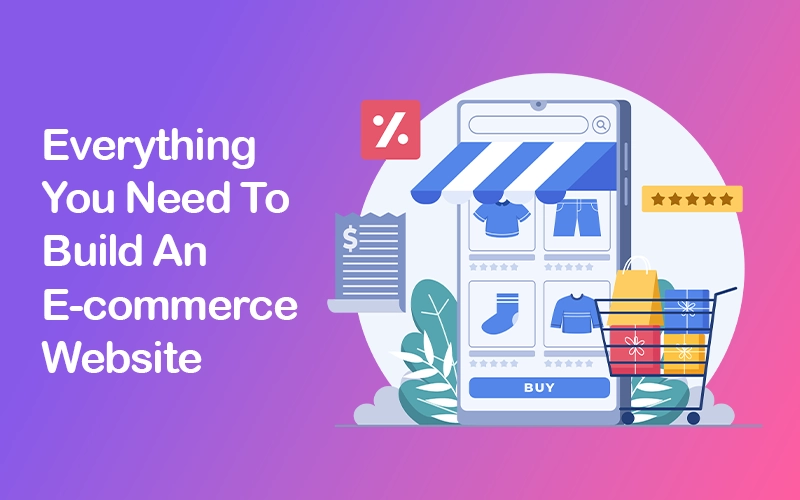With the growth of online shopping, businesses need to have a strong online presence. Whether you’re starting a small online boutique or expanding your existing business to reach a global audience, having a well-built e-commerce website is a game-changer.
Today, building an e-commerce website has become more accessible than ever before. However, many new online business owners need help understanding how to create an e-commerce website. That’s where this guide comes in. We’ve compiled a list of essential tools that simplify the process for beginners, covering everything from selecting a domain to managing inventory and ensuring legal compliance.
Why Build an E-commerce Website?
E-commerce has grown a lot over the years, changing from a small market into a major part of retail. According to Statista, global e-commerce sales are expected to surpass $6.3 trillion by 2024. A well-built e-commerce website lets you reach this huge market, selling your products or services to customers around the world at any time. However, building an online store requires more than just listing products – it involves careful planning, strategic choices, and the right tools to ensure your website is professional, functional, and optimized for success. This guide will walk you through the essential steps and introduce you to tools and resources that make the entire process of building an e-commerce website seamless, even for beginners.Steps to Building an E-commerce Website:
1. Choosing a Domain and Hosting –
The first step in creating an e-commerce website is choosing the right domain name and hosting service. Your domain name is your online identity, and it should be unique yet easy to spell and relevant to your brand or business. Exploring smart domain name ideas at this stage can help you find a name that’s both memorable and aligned with your brand vision.
Hosting is just as important because it affects your website’s speed and security. That’s why always choose a hosting service that gives good performance, helpful support, and can grow with your business.
Some recommended hosting providers include Hostendo, Hostverge, and HyperHost, all of which offer great deals for e-commerce websites.
2. Design & Development –
Once you have your domain and hosting sorted, the next step is to choose a platform to design and develop your e-commerce store.
Now, you don’t need to be a coding expert to build a professional-looking site. There are several website builders in the market that offer drag-and-drop functionality that allows even beginners to create visually appealing and functional e-commerce websites.
3. Payment Gateway Integration –
Now, an essential part of any e-commerce site is the ability to accept payments securely.
Integrating a trusted payment system is extremely important for your customers to pay safely without worrying about security or fraud. Some popular payment gateways, such as PayPal, Stripe, and Square, offer seamless integration with most e-commerce platforms, ensuring secure and hassle-free transactions.
Another factor to consider when choosing a gateway if you plan to sell internationally is its multi-currency support.
4. Product Listing and Management –
It is very important to keep your e-commerce site professional and to organize and manage your products well. To do this, you need to upload product images, sort items into categories, and keep track of inventory. You can find online tools that help automate product descriptions and improve them for SEO, saving you time and effort.
Some tools help you can manage multi-channel selling, track inventory, and generate detailed analytics reports, all from a single platform.
5. SEO and Marketing Tools –
After all this, if you think having a beautiful e-commerce website is enough, you are wrong. A good website means nothing if your potential customers can’t find it. That’s where SEO (Search Engine Optimization) comes in. Optimizing your website ensures your products appear in relevant search results, driving organic traffic to your website.
Most e-commerce platforms come with built-in SEO features, but you can enhance your website’s visibility further with specialized SEO tools.
In addition to SEO, marketing tools like email automation and social media integration play important roles in promoting an e-commerce store.
Essential Tools for Building an E-commerce Website:
Now that we’ve covered the steps to building an effective e-commerce website let’s explore the tools that can help you create a successful one.
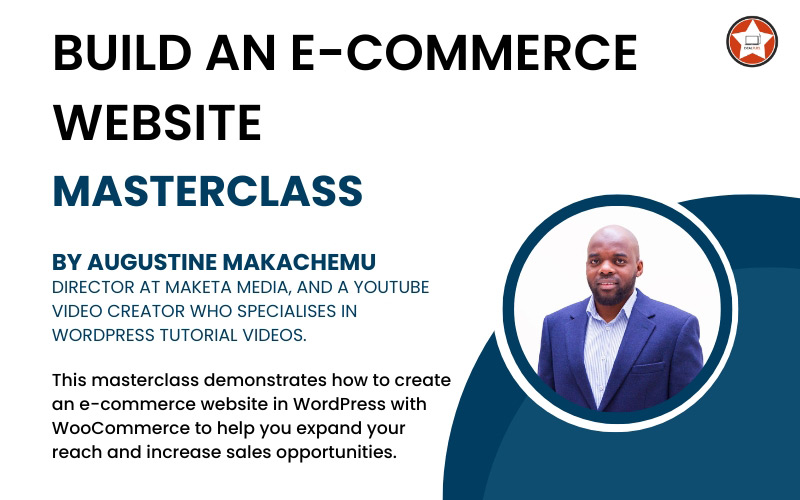
Before going straight to the tools, it’s beneficial to get some foundational knowledge.
The Masterclass: How to Build an E-commerce Website is a comprehensive resource for beginners.
MAK, a Web Design expert & YouTuber, demonstrates how to build an eCommerce website using WooCommerce in WordPress from scratch.
This Masterclass can help you learn –
- The ins and outs of WordPress
- Why WooCommerce is the go-to e-commerce plugin.
- Essential steps to set up WordPress and seamlessly install and configure WooCommerce
- Expert guidance in configuring crucial WooCommerce settings for your online store’s success
And a lot more.
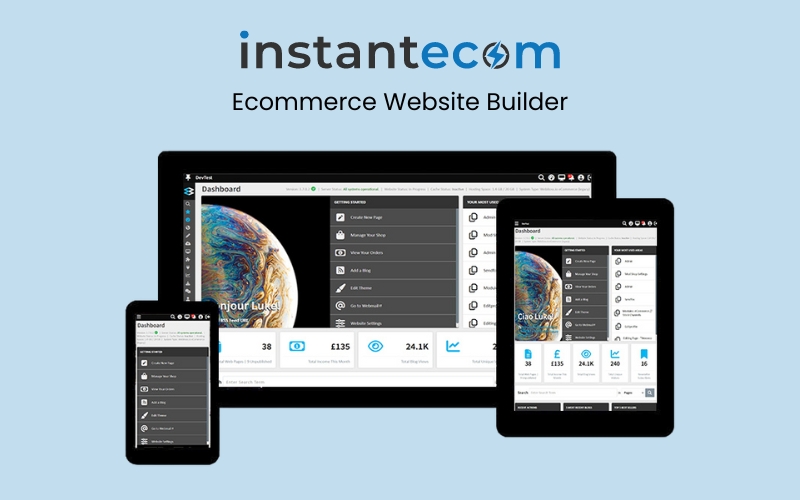
InstantEcom is an e-commerce website builder that lets you create a great online store without needing to code. It offers customizable themes and eye-catching images to make your site stand out.
You can easily connect your store to social media to reach more people, and it helps boost your visibility with search engine optimization (SEO) to attract more visitors. Managing your products is simple too, with flexible displays and easy syncing of your stock across channels.
Features of Instantecom:
- Website Customization – Customize your store with themes that match your brand identity.
- Social Media Integration – Seamlessly link your website to social media platforms for better engagement.
- Search Engine Optimization- Improve visibility with SEO tools to reach more online visitors.
- E-commerce Product Management – Easily manage your entire product catalog for better organization.
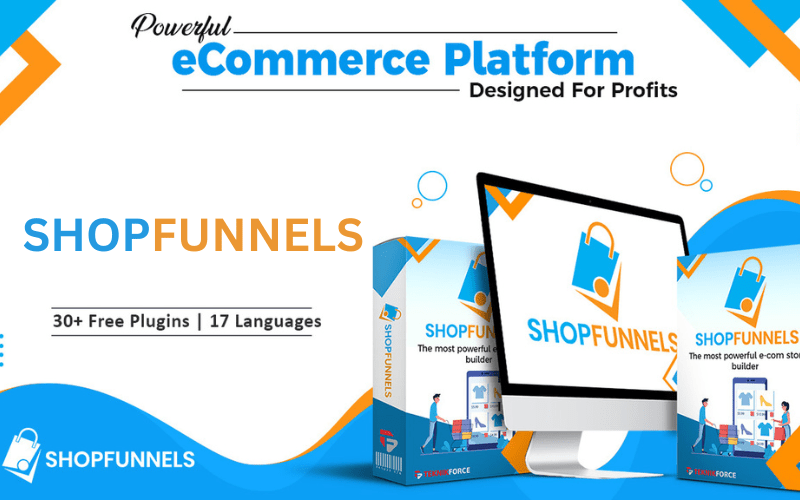
ShopFunnels is an all-in-one e-commerce platform that helps you build high-converting online stores quickly, with no coding skills needed.
This powerful software helps you create a smooth shopping experience for your customers from beginning to end, giving you all the tools to boost sales and grow your business faster.
The best part about ShopFunnels is that it doesn’t take any commission on your sales, so all the money you earn stays with you!
Features of ShopFunnels:
- Integrates with dozens of payment gateways
- Creates coupons and discount codes
- Offers in-built abandoned cart reminder
- Provides more than 20 powerful, readymade plugins that you can use for free

Kua.ai is an AI-powered content generator made for e-commerce, helping store owners and marketers easily create accurate, on-brand, and SEO-friendly content.
It simplifies content creation for platforms like Shopify, WooCommerce, WordPress, Amazon, and eBay. Kua.ai cuts down manual work and automates the process, making content creation faster and more efficient.
Features of Kua.ai:
- 200+ Templates: Kua.ai offers over 200 AI templates for Amazon, websites, SEO, social media, and email marketing, covering all your e-commerce needs.
- AI Workflow: AI workflows process detailed information, allowing for the creation of more complex content.
- Access to eCommerce Data: Get Google trend data in templates and apps, ensuring data-driven decisions.
- AI Chat: Chat with AI, similar to ChatGPT, with web access via Google Search for up-to-date, fact-based responses.
5. TikSale – All-In-One Tool for E-commerce Sellers:
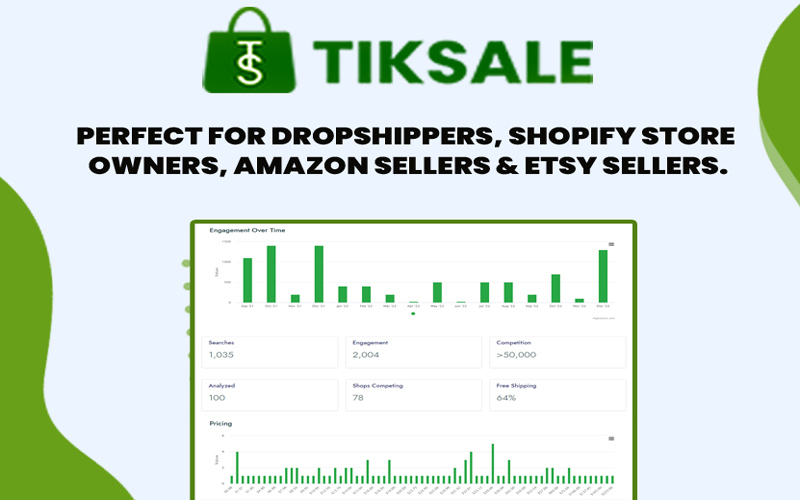
TikSale is an essential tool for multi-channel e-commerce sellers. It offers inventory management, analytics, and support for multiple selling platforms like Amazon and eBay.
TikSale is the first all-in-one tool for e-commerce sellers that also supports drop shipping.
TikSale also shows key stats for profit, analytics, engagement, links, Facebook ads, product videos, Facebook targeting, and offer types.
Features of TikSale:
- Tiktok: Find the Best Viral TikTok Products and Competitors’ Ads.
- Etsy: Use TikSale to Unify every aspect of the Etsy seller journey, from research to marketing.
- Dropshipping: Discover winning products and highly profitable campaigns within minutes.
- Social Trends: Find the top global trends on BuzzFeed, YouTube, Twitter, and Instagram.
A good hosting provider is the backbone of your e-commerce website. PawnHoster, Hostverge, and StartHost offer affordable and reliable hosting solutions specifically designed for e-commerce businesses. They provide scalable hosting plans, ensuring that your website can handle increased traffic as your business grows.
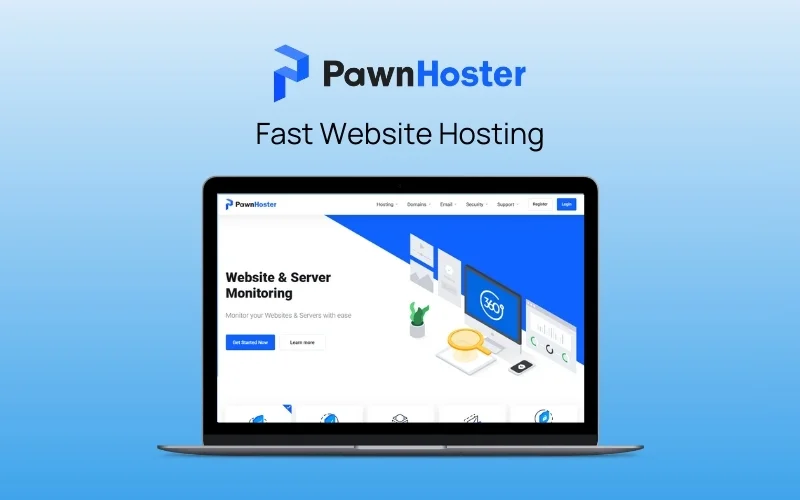
Features of PawnHoster:
- Unlimited Websites
- Unmetered SSD Storage (NVMe/SSD)
- Unmetered Bandwidth
- Unlimited Subdomains
- Unlimited Email Accounts (Mailbox Storage)
- Daily Automatic Backups
- Free SSL Certificates
- Automated Malware Scanning (Spam Protection & Malware Scanning)
- High-Speed Hosting with LiteSpeed Technology
- Free CDN Integration (via Wildcard SSL/CDN Access)
- Easy-to-Use Control Panel (cPanel access, single account)
- 24/7 Premium Support (via 24/7 Technical Support)
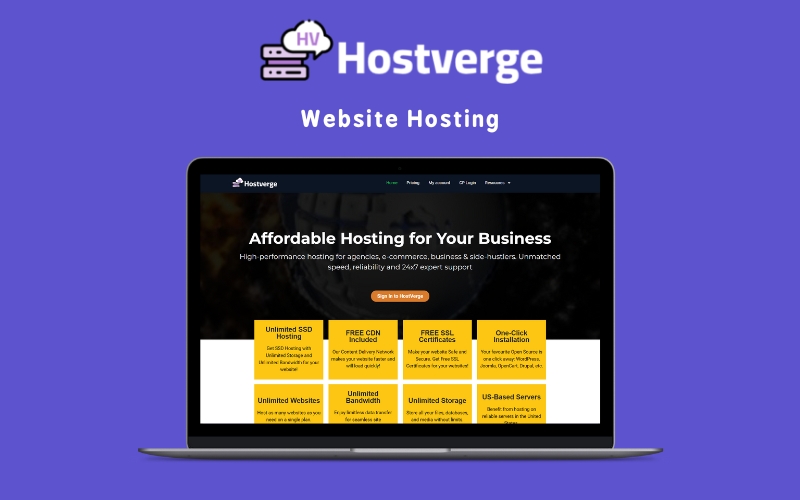
Features of Hostverge:
- Unlimited Domain Hosting
- Unlimited Sub-Domains
- Unlimited Email Addresses
- Unlimited MySQL Databases
- Unlimited Storage
- Unlimited Bandwidth

Features of StartHost:
- Unlimited Domain Names Hosted (Websites)
- Unlimited Storage (SSD Storage)
- Unlimited Bandwidth
- Unlimited Sub-Domains
- Unlimited Email Addresses
- Unlimited SSL Certificates (Free SSL)
- Free CDN Included
- One-Click Installer (for WordPress, Joomla, Drupal, etc.)
- Advanced Security Features
- 24/7 Support Team (via 24/7 Helpdesk/Chat Support)
- User-Friendly Control Panel
7. Privacy Policy Software – WP Legal Pages Compliance Platform & Digidly:
Legal compliance is a crucial aspect of running an e-commerce website. WP Legal Pages Compliance Platform offers customizable privacy policy templates to ensure that your website complies with GDPR, CCPA, and other international regulations.
Digidly is another great alternative that simplifies legal compliance for online businesses.
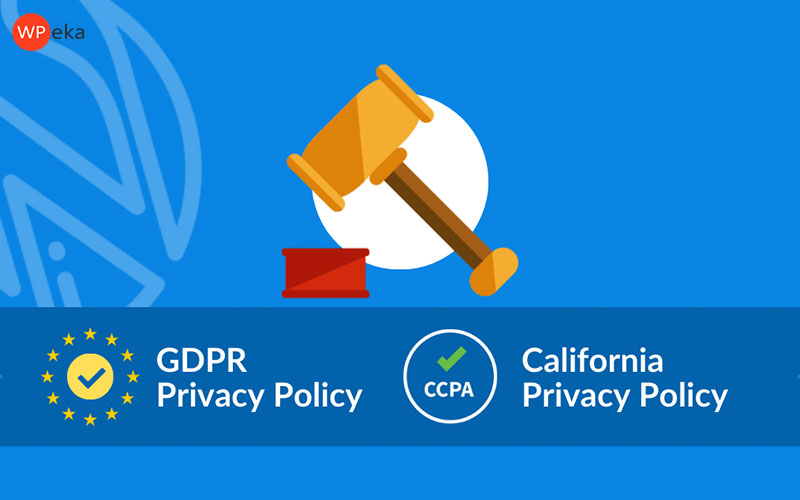
Features of WP Legal Pages Compliance Platform:
- 10 Sites
- 21+ Pro Legal Templates
- 4 Free Legal Templates
- Age Verification Popup
- Force Agreement
- One-click Affiliate Disclosure
- Advanced Dashboard
- 20,000 Pages Per Scan
- Consent Log
- Revoke Consent
- Data Processing
- Geo-targeting
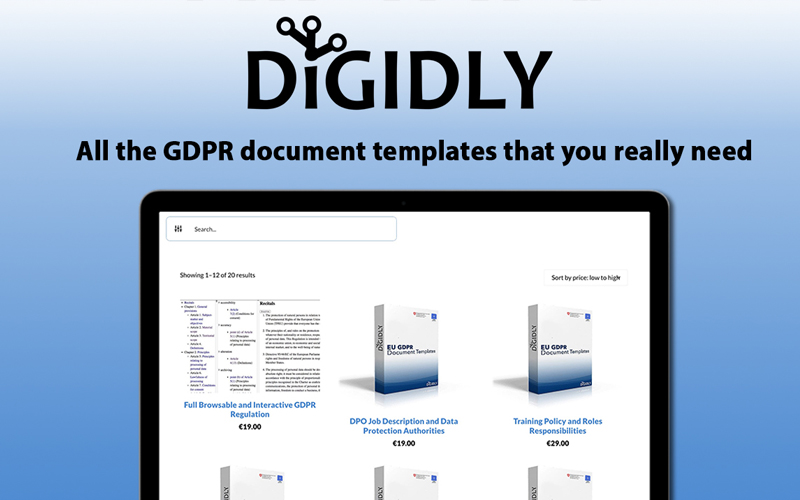
Features of Digidly:
- Data Protection Authorities in EU.docx
- DPO Job Description.docx
- Employee Presentation. pptx
- Consumer Rights.docx
- Data Subject Consent Withdrawal Form.docx
- GDPR Roles and Responsibilities.xlsx
- Data Breach Policy.docx
- Data Privacy Policy for websites.docx
- Data Privacy Policy.docx
- Privacy Notice.docx
- Data Subject Access and a lot more
Conclusion
Building an e-commerce website may seem like a difficult task, but with the right tools and resources, it’s easier than ever before. From choosing the right domain and hosting to designing a user-friendly website and integrating secure payment gateways, the tools mentioned in this guide can help you set up a successful e-commerce store in no time.
By using website builders like Instantecom, content generators like Kua.ai, and multi-channel management tools like TikSale, you can streamline your e-commerce operations and focus on growing your business. Don’t forget to check out hosting deals and legal compliance platforms to ensure your site is fast, secure, and legally sound.
Start exploring these tools today and take the first step toward starting an online business.




